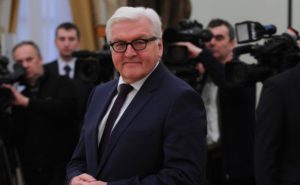Steinmeier Nominated as Federal President of Germany
Frank Walter Steinmeier, Germany’s current Foreign Minister and a member of the Social Democratic Party (SPD), was officially presented as the coalition government’s presidential candidate on November 16 after German Chancellor Angela Merkel and her conservative supporters agreed to back him.

The prospect of Steinmeier’s victory is high, considering that both his own center-left party and conservative politicians have offered their support. The coalition between the three dominant political parties - the Christian Democratic Union (CDU), Christian Social Union (CSU) and SPD - holds dominant power in the electoral college, which will help its joint presidential candidate beat candidates supported by the Left Party and the Green Party.
During his acceptance speech, Steinmeier claimed that he wanted to smooth out the divisions in German society through fruitful political exchange. He does not want to deepen party lines, but instead create a political culture in which differing views are treated with respect. Steinmeier is concerned about the rise of right-wing populism across the European continent, particularly the spread of anti-immigrant sentiment and nationalist rhetoric. He added that “a president must not be someone who simplifies; he must be someone who instills confidence,” and expressed his desire to be an optimistic thinker at this time of social division.
The federal president position in Germany is largely ceremonial and symbolic and is not chosen through popular vote but rather through the federal Convention, an assembly of members of the federal parliament and delegates from state parliaments. The role is meant to transcend party politics, and the president is expected to act more as a moral leader. Steinmeier has high personal approval ratings, and the German public recently applauded him for making direct, critical comments towards British Foreign Minister and Brexit figurehead Boris Johnson. Chancellor Merkel also described Steinmeier as the right leader with political experience both nationally and internationally. She added, “At a time when there's unrest and instability around the world, sending a signal of stability - and so the conservatives supporting Steinmeier's candidacy - is, in my view, right and important.”
Germany’s presidential election will be held on February 12, 2017. One rising concern with Steinmeier changing his position is the appropriate appointment of a new foreign minister in Germany who will take on the responsibility to maintain stable diplomatic relationships with eastern European countries, especially Russia.
